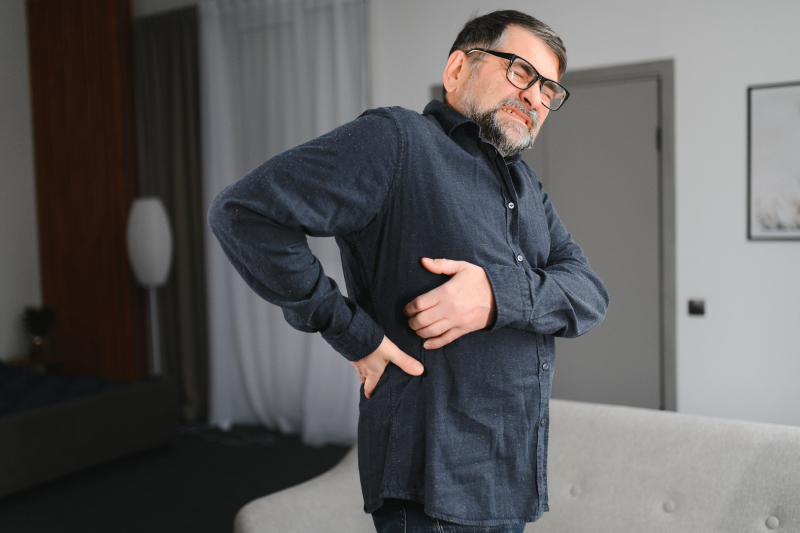
The piercing pain came on quickly and won’t leave you alone. Over-the-counter pain medication barely takes the edge off. Could it be a kidney stone?
“Kidney stones affect approximately 1 out of 10 people,” says Matthew Baker, PharmD, PA-C, a certified physician assistant and pharmacist at Beaufort Memorial Urology Specialists. “Recognizing the symptoms and working to manage the problem can bring much-needed relief.”
Causes and Kinds of Kidney Stones
Urine contains various chemicals and substances, and kidney stones can form when there are high concentrations of specific minerals and salts.
When there’s too much waste in too little liquid, crystals begin to develop, leading to the formation of stones. While there are several types of kidney stones, most are classified based on the substances that cause them.
These types are:
- Calcium stones — The two types of calcium stones come from calcium oxalate and calcium phosphate. Calcium stones are the most common type of kidney stones, and they occur when you have excess calcium in your urine.
- Cystine stones — Making up fewer than 1% of all kidney stones, cystine stones often develop in childhood. They arise from too much cystine, an amino acid that helps form protein.
- Struvite stones — Frequent urinary tract infections (UTIs) can reduce the acidity of your urine. Sometimes, this leads to the development of magnesium ammonium phosphate (struvite) stones.
- Uric acid stones — Chemical changes in your body produce uric acid, which can result in stones. Your risk increases with Type 2 diabetes, gout, being overweight or eating lots of animal protein (including organ meats) and few fruits and vegetables.
Read More: Kidney Infection vs. UTI: Do You Know the Difference?
Risk Factors for Kidney Stones
One of the main risk factors for kidney stones is dehydration. If you don’t drink enough water, your body has less water to dilute calcium, cystine and other substances. Kidney stones form less quickly when water is available to prevent crystals from sticking together in urine.
Other risk factors for kidney stones include:
- Diet — Eating lots of sodium or animal protein can increase your risk.
- Genetics — Your genetics can lead to imbalances that cause kidney stones. Additionally, you’re at higher risk if a parent or sibling has a history of kidney stones.
- Health history — Diabetes, inflammatory bowel disease, obesity and regular UTIs make developing kidney stones more likely.
- Medication — Some medications can increase your risk. Examples include calcium antacids for indigestion and diuretics to reduce the amount of water in your body.
Experiencing Kidney Stones
Smaller stones may not cause symptoms. You may pass them through your urine and never know they were in your body. Larger stones, however, can produce a number of unwanted symptoms.
“Symptoms can start suddenly,” Baker says. “However, they often begin when stones enter the ureters, the tubes that transfer urine into the bladder.”
Symptoms include the following:
- Bathroom issues — You need to urinate more often than usual or have reduced flow of urine. Your urine may smell abnormally bad, be cloudy or contain blood. If blood is present, your urine may be red, pink or brown.
- Pain — The telltale symptom of kidney stones is sharp pain in the back, groin, lower abdomen or side. It may also hurt to urinate.
- Related problems — Along with the symptoms above, you may have a fever and chills. You may feel nauseated or vomit.
Read More: What Your Urine Smell, Color and Flow Are Telling You
Naming Your Problem
A few tests help confirm the presence of kidney stones. In addition to a physical exam and discussion of your symptoms and medical history, your provider may perform the following:
- Blood tests — These tests help identify abnormal levels of calcium, uric acid and other substances that may cause kidney stones.
- Imaging tests — Ultrasound, X-ray and CT scans give an inside view of what’s going on in your kidneys or abdomen.
- Urine tests — Laboratory testing can detect blood or other substances in the urine that may indicate kidney stones.
Getting Kidney Stones Out of Your Body
Kidney stone symptoms continue until the stone gets out of your body. According to the National Institutes of Health, this process can take days or weeks. In the meantime, drink at least six glasses of water every day to produce plenty of urine to help pass the stone at home. Over-the-counter or prescription pain medication can help manage pain. You should also urinate through a strainer.
“It sounds odd, but straining your urine allows you to catch the stone when it comes out,” Baker says. “We can then figure out what type of kidney stone you have and create a more specific preventive plan moving forward.”
When to Seek Medical Attention
If you experience severe pain or you can’t pass the stone on your own, contact your primary care provider or urologist. You may need to visit the hospital for more aggressive treatment.
Based on the type, location, size and shape of your stone, you may benefit from one of the following treatment options:
- Lithotripsy — Your urologist aims sound waves at the kidney stone, breaking the stone into small pieces that pass through your body via urination.
- Medication — A variety of prescription medications can help troublesome stones move through your urinary tract. Other medication helps prevent future stones by reducing the amount of calcium or other substances in your urine.
- Surgical removal — During percutaneous nephrolithotomy, the urologist makes a tiny incision in your back and guides a thin tube (endoscope) to the site of the stone. Once there, the urologist removes the kidney stone, then closes the incision. In rare cases, the procedure is performed through a large incision.
- Ureteroscopy — This procedure involves the use of laser technology to break stones into smaller pieces. This procedure is often employed for stones in the lower urinary tract, as well as for those located in the kidneys and ureters.
Read More: Understanding and Managing the Risk Factors of UTIs
“Kidney stone treatment provides quick relief and gets you back to life,” Baker says. “That said, it’s best to prevent stones from forming. Drink enough fluid, watch your diet, keep other health issues under control and work with your primary care provider to reduce your risk for this common and painful condition.”
Could your pain be caused by a kidney stone? Start a video visit or find an Express Care Clinic near you to find out.


